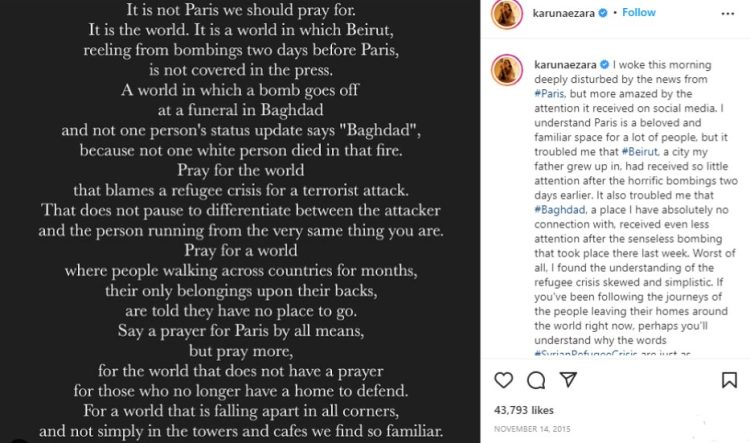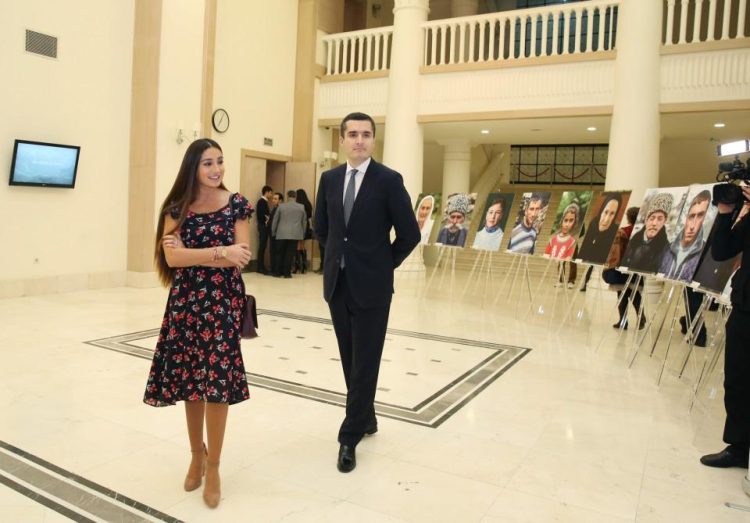Poetry wasn’t one of the subjects most people enjoyed in high school. This is largely because some literature teachers forced their students to overanalyze every verse they read, just like poet Arzu Aliyeva. Aliyeva isn’t only the daughter of the Azerbaijani president, Ilham Aliyev, she is also an accomplished author, poet, and documentary producer.
She believes that most of us lost our natural love for the genre. But when it’s time to express emotions such as grief and love, everyone becomes an overnight poet.
With the introduction of social media, it has become easier for people to write and publish short lines of poetry. For instance, on Instagram, you can find posts bearing the hashtag Instagram poetry. And on Twitter, #micropoetry has become a thing.
Aliyeva believes that poetry is also shedding more light on the issue of mental health. More poets are breaking barriers to speak about the abuse they suffered at some point in their lives.
While this seems brave, it is the liberating power that we all need to speak up about issues that bother us without being shamed.
Why Poetry Will Always Be an Essential Part of Society

According to Britannica, poetry is “literature that evokes a concentrated imaginative awareness of experience or a specific emotional response through language chosen and arranged for its meaning, sound, and rhythm”.
Arzu Aliyeva says that poetry holds an important position in society. Poetry is a powerful way to share experiences in order to make others understand where we are coming from and how we feel about certain societal issues. She strongly believes it is a vehicle for conveying social justice messages.
Although social justice cases do not get resolved quickly, poetry creates varying levels of awareness. It captures ongoing events and sparks conversations around the world. It even spurs us to take action, think critically, or become more empathetic.
Poetry cannot be extracted from society because it helps us to tell our own stories. So, it has come to stay. However, its role will keep changing to adapt itself to the dynamic events happening all over the world.
The Phenomenon of “Instagram Poets”
Instagram Poets are simply poets. But what makes them exceptional is their ability to leverage Instagram’s short quote templates and sharing tools to curate poems. As a result, a little message will hold so much meaning.
The likes of Atticus, Nikita Gill, and Rupi Kaur have been able to circumvent Instagram, a platform that is heavily driven by photos, to promote words.
Aliyeva shares that most Instagram poets have a large number of followers, making it difficult to ignore their works. While each poet has a unique writing style, their content appeals to both Gen Zs and Millennials.
Even more interesting is the fact that the popularity of these poets has increased the demand for traditional poetry.
The best example of this according to Aliyeva is Rupi Kaur. Kaur’s posts helped her work to gain the publicity that she required as an Indian woman. The topics she writes about might never get the exposure she wants especially in the corridors of western publishers. With 3 books already launched, she has sold out millions of copies in several countries and languages. In 2017, The New York Times quoted that Kaur was “kicking down the doors of publishing.”
Without any doubt, Arzu Aliyeva can safely say that Instagram builds readership for poets and makes their work more accessible.
Arzu Aliyeva Shows How Social Media Makes Publishers Redundant

People use poetry to display strong emotions such as grief, fear, and doubt, particularly in periods of tragedy and unrest. But the timeliness with which we expect our poems to be published can’t be achieved when we knock on the doors of publishers.
The traditional process of publishing involves writing, submitting, and waiting for the publisher to produce and distribute your work. When a subject involves a sense of urgency, then the waiting period defeats the aim of poetry. Aliyeva strongly believes that this is especially true for poems that seek to respond to social issues.
Additionally, traditional publishing has a limited readership. Only a few books can be published each year, which isn’t enough to go around the world. As a result, the revenue of authors is limited too.
Aliyeva agrees that because of the limitations of traditional channels of publishing, poets now utilize the internet to connect directly with prospective readers.
Following the popularity of social media among authors, a study analyzed the use of Twitter and Facebook as marketing tools in the publishing industry.
The researchers discovered that social media is a very effective tool for marketing if the author has a good number of followers. Therefore, if there is an already existing community, the author will be able to engage with readers.
Aliyeva says that while many poets utilize social media, one may think that publishing houses have become redundant. But that’s not true.
In the real sense, the popularity of online poets is attracting the attention of publishers to hidden talents. It is also helping poets to find markets for self-publishing their books.
Social Media as a New Way of Uncensored Self-Expression

Self-expression is one’s ability to express thoughts, feelings, or ideas, through dance, music, writing, or other forms of art and according to Arzu Aliyeva, young people are harnessing the power of social media to express themselves.
She states that it is a platform for voicing our opinions and gaining validation from people. Getting a like or a love emoji on your social media post is synonymous with getting a thumbs up during a school debate. And this validation can come from even people who you do not know offline.
Some people believe that they have to present their lives as perfect online. Doing this makes social media judgmental and stressful. It zaps the fun that you should enjoy from the platform, in Aliyeva’s opinion.
However, for those of us who understand the simplicity of social media, we can now speak about the things that border us. We can describe the tragedies we face daily or the things that make us smile.
Unlike social media, traditional media may censor your thoughts. A publisher may decide not to publish a portion of your work or the entire work because it may offend a particular set of people in society.
But self-expression on social media is a form of self-honesty because you’re writing the thoughts in your head as they are, without bias. And you can share your thoughts on any subject without being censored.
Arzu Alieva believes Poetry is Important for Mental Health
Mental health is one of the topics that is currently gaining much attention. Before now, people struggled to talk about depression, anxiety, and other mental illnesses.
However, poetry has provided a medium for explaining our fears and struggles to others. For instance, Sabrina Benaim’s Explaining My Depression to My Mother had tears dripping down my cheeks as I came to understand the deepest fears of depressed people.
Aliyeva says that when you write poems, you are not only expressing yourself but also giving room for others to share in your pain.
A paper published in 2024 shows that reading or writing poems has a therapeutic effect on people suffering from mental health disorders as well as their caregivers. Therefore, poetry opens us to new ways of healing from depression, stress, and anxiety.
In the words of Psychiatrist Robert Caroll
“Our voices are saturated with who we are, embodied in the rhythms, tonal variations, associations, images, and other somatosensory metaphors in addition to the content meaning of the words. Our voices are embodiments of ourselves, whether written or spoken. It is in times of extremity that we long to find words or hear another human voice letting us know we are not alone.”
Poetry is an old form of writing. From the time of the cavemen, events were preserved in stories and pictures. In modern times, the internet has helped to draw the interest of young people in poetry. Arzu Aliyeva says that this only proves to her that Poetry will never completely disappear for it is a highly adaptable medium for the soul.
 Hi Boox Popular Magazine 2024
Hi Boox Popular Magazine 2024



